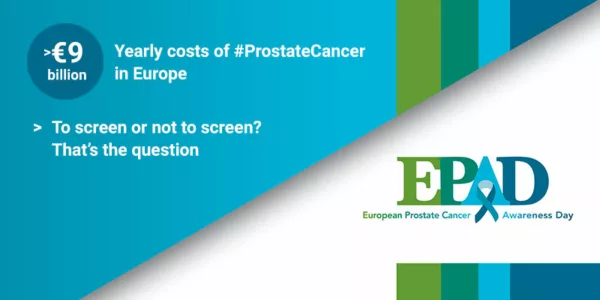EPAD19: European PSA screening programme is on its way - Part 2
The Policy Paper on PSA Screening for Prostate Cancer can be downloaded at epad.uroweb.org

Quality of Life
“Early detection of PCa is not only about decreasing mortality rate, but it’s also about Quality of Life”, says André Deschamps, chairman of Europa Uomo. Their study shows that a minority of European men (48%) is aware of the risks of PCa. Looking at health care professionals, about half of the GPs promote PSA testing. Deschamps states: “Early treatment for prostate cancer lowers the risk of incontinence and impotence significantly, while treatment at metastatic phase has a negative effect on the quality of life. Hence, there is a big opportunity to improve the quality of life if early detection is achieved in combination with avoidance of overtreatment.” Deschamps pleas for a new strategy based on increasing awareness at EU level, promote PSA led screening with treatment in specialised cancer centres.
Costs vs Savings
The main advocate of the policy paper and the initiator of the event in the European Parliament, Prof. Hein Van Poppel (BE) discussed the consequences of less screening. “In the United Kingdom, 4 out of 10 prostate cancer diagnoses are currently diagnosed at a locally advanced or metastatic stage. In the United States, after a documented long decline of death rates of prostate cancer, prostate cancer mortality is increasing for the 1st time since early 1990. Moreover, an increase in the number of patients with metastatic and advanced disease has been observed at the same time. This all has happened in parallel with PSA screening decline”, says Van Poppel. “The total costs of lifetime care of a metastatic prostate cancer patient sums up to €240,000”, Van Poppel continues. “These costs are applicable in case of late detection. Early detection equals €5,000 per patient on average. If we wouldn’t have had the overdiagnosis issues, we would have saved the lives of thousands of men.”
Lack of Guidelines at EU level
Since PSA screening ultimately reduces the rate of men with metastatic PCa at diagnosis and, in turn, mortality, different organisations have reconsidered their views on screening. The European Association of Urology (EAU) released its recommendations on early detection in the year 2013. According to Prof. Nicolas Mottet, the chairman of the EAU Guidelines panel for prostate cancer, the only way to find aggressive prostate cancer at an early stage is an early diagnosis. With the upcoming EU elections, the new college of Commissioners should be empowered by the European Parliament and Member States to support Member States with European guidelines on prostate cancer screening.
Hitting the Target
It is clear that early diagnosis is the remedy, but how to select those men that benefit from early testing to prevent overdiagnosis? Prof. Monique Roobol explains the benefits of risk stratification in combination with new developments as mpMRI and targeted biopsy. “Hitting the target has never been this easy”, she says. “With coordinated screening we will be able to improve mortality reduction, avoid unnecessary testing and overdiagnosis, but also uncertainty, anxiety and costs!”
Call to Action
After all the presented evidence, the European Union can no longer continue to overlook the most common cause of cancer in men in Europe which developed to be the number two cancer killer in men. Urgent action is required to ensure the new Commission is mandated to support EU Member States in prostate cancer screening in their national cancer plans. EAU Policy Coordinator, Michelle Battye (GB), makes a statement with the following recommendations for call to action:
- The 2003 Council Recommendations on population-based screening need to be urgently reviewed, with prostate cancer added to the list of cancers to be addressed
- Member States should already support a policy update on prostate cancer screening through their work on the EU Joint Action, the Innovative Partnership for Action Against Cancer (IPAAC)
- MEPs should ensure that European action on Prostate Cancer screening is included in the group manifestos as they prepare for Europe elections
- The new college of Commissioners mandated in 2019 should be empowered by the European Parliament and Member States to support Member States with European guidelines on prostate cancer screening
- Member States should bring good practice on prostate cancer screening to the Steering Group on Health Promotion, Disease Prevention and Management of non-communicable diseases
- European Commission encouraged to channel more support and funding to Prostate Cancer screening and research
PCa Screening in Joint Action
Dr Tit Albreht (SL), coordinator of Innovative Partnership for Action Against Cancer (iPAAC) Joint Action, reflects on early detection and screening from a political point of view. He raises the need to continue to work on reducing stigma about cancer to help improve, among other issues, early detection, but identifies also some challenges like the complexity of targeted screening and identification of gaps. Nevertheless, he is definitely committed to adding prostate cancer screening on the Roadmap on Implementation and Sustainability of Cancer Control Actions. This important step is the opening to implementing recommendations on prostate cancer screening at a European level.
MEP Lieve Wierinck endorsed this commitment by Albreht: “Evidence of the efficacy of clever PSA screening for early detection of prostate cancer in well informed healthy men is clear. We now need to take action. I will encourage my fellow MEPs to put this topic on their agenda for the upcoming EU elections”, Wierinck concluded.
The Policy Paper on PSA Screening for Prostate Cancer can be downloaded at epad.uroweb.org


